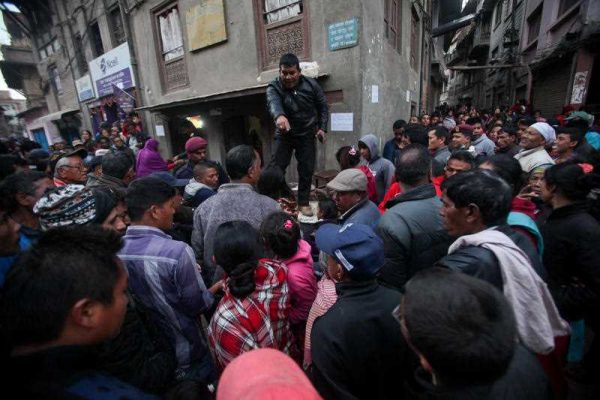Since the constitution was promulgated on 20 September, over 50 people have died and almost 1000 have been injured in protests or related conflict.
The new constitution has been particularly controversial in the Terai plains, along Nepal’s border with India. Many Madhesi communities in the Terai plains believe that the new provincial boundaries laid out in the constitution will curtail their political representation. They also feel that the constitution fails to adequately protect the Madhesi people, allowing abuse and discrimination to continue.
Many Madhesi also feel targeted by new citizenship requirements. Before a newborn child can receive Nepali citizenship, the mother must now prove that the father of her newborn is not a foreigner and that the child was born in Nepal. This is particularly problematic in the Terai, which shares an open border with India.
The Madhesi movement is fuelled by a history of oppression, and a lack of political and social representation in the capital. There are ongoing tensions between some Madhesi and ethnic groups originating from nearby hill areas, often referred to as Pahadi. Some Madhesi groups feel that Pahadi communities have wrongfully appropriated fertile Terai land and pose a threat to regional languages and customs. The use of Nepali as the official governmental language, rather than regional languages, has led to further feelings of exclusion.
Many non-Madhesi feel differently about the situation. Anti-Indian sentiment is common, and some feel threatened by the close links of many Madhesi communities to India. Others claim that the Madhesi are political pawns being used by India to influence Nepalese domestic policy.
The impact of the Indian border blockade, which began in September as an anti-constitution protest, has fuelled such suspicions. According to the Nepalese Chambers of Commerce and Industry, the blockade has caused a loss of over NPR 1 billion (about US$9.3 million) and wreaked havoc on schools and hospitals.
In the growing unrest, Madhesi protesters have organised strikes, riots, blockades and, more disturbingly, lynchings and bombings, while police have employed intimidation, physical violence and, in extreme cases, used live rounds. Curfews have been declared and certain areas have been designated as restricted or prohibited. While this is designed to contain the violence, the curfews have drawn criticism for their impact on freedom of movement in an economy already hampered by strikes.
The human rights of many Nepalis, and the country’s future stability, are under serious threat from both Madhesi agitators and government security forces.
In November 2015 the National Human Rights Commission (NHRC) published a report on Nepal’s human rights situation following the promulgation of the constitution. Its findings are deeply concerning. Rights to life, freedom and security, peaceful assembly and freedom of expression — all of which appeared both in the 2007 interim constitution and in the new constitution of 2015 — were found to have been infringed. The NHRC report states that in several districts police were found to have beaten, insulted or inhumanely treated members of the public.
A report by Human Rights Watch in October published more allegations of police brutality, including police breaking into homes, physical abuse, racial abuse and verbal threats as well as harassment of communities perceived to be opposed to the constitution.
But human rights abuses are by no means limited to state forces. In multiple districts, agitators were found to have abused human rights. To give one example, on 24 August in Tikapur municipality, seven policemen as well as an 18-month-old boy were killed by protesters after clashes between agitators and security forces spiralled out of control.
Investigators and journalists attempting to cover the issue have also been threatened by both protesters and security forces. Media houses have been vandalised and some have been set on fire. Both sides need to be held to account.
One of the biggest concerns now is the potential for violence to escalate. When state security forces commit abuse, it increases the resolve of the agitators and gives fuel to claims of discrimination. An article on online platform Madhesi Youth claims that many moderate and apolitical Madhesis only started supporting the protest movement following heavy-handed police tactics in Tikapur.
Both sides must take concrete actions to de-escalate tensions. While populist language from politicians may serve to boost their party’s profile, it does little to help the average citizen. There are growing concerns surrounding the adversarial rhetoric often used when discussing Madhesi–Pahadi tensions. Such language may fuel division in the long term, threatening to disrupt the stability of a country still reeling from the effects of April’s earthquake.
The government of Nepal must investigate and prosecute members of the security forces that have been found to have used excessive force. Likewise, the leaders of the Terai parties should condemn those members who have used violent methods of protest.
Schools that struggled to reopen after the earthquake have been forced to close. Hospitals are in danger due to a lack of essential medicines and Nepal’s economy is reeling. Yet members of the agitating Samyukta Loktantrik Madhesi Morcha and the United Democratic Madhesi Front continue to clash with police with no end to the crisis in sight.
Conflicting interests, perspectives and unsolved historical grievances make a complete and timely resolution to the crisis unlikely. Yet it is precisely the complex nature of the crisis that makes a resolution so vital. In the absence of a resolution, the human rights situation will deteriorate further and may scupper what little chance Nepal has of swiftly recovering from the earthquake.
Maximillian Mørch is a journalist based in Kathmandu.

